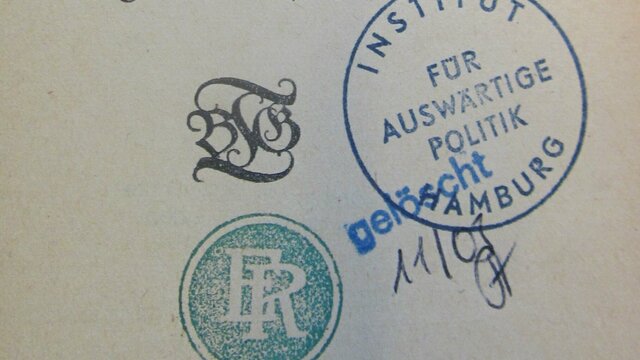The multi-year research project entitled Die Juden in Hamburg im NS‐Staat (“The Jews in Hamburg in the Nazi State”) (Part 1: 1933 to 1938 and Part 2: 1939 to 1943/1945) represents a continuation of the two-volume documentation by Ina Lorenz on Die Juden in Hamburg zur Zeit der Weimarer Republik (“The Jews in Hamburg during the Weimar Republic”). The effort involved systematic evaluation of rich source materials from public and private archives in Germany, Israel, and the USA as well as numerous Jewish regional newspapers and magazines in addition to Hamburg Nazi press organs. Furthermore, private letters, personal records, and biographical bequests were reviewed. In general, only authentic contemporary documents, created directly in the period from 1933 to 1945, were considered for the documentation.
A very extensive part of the files of the Hamburg German-Israelite Community, from 1938 onward, of the Jewish Religious Organization (Jüdischer Religionsverband e.V.), and from 1942 onward, of the Branch Office Northwest Germany, Reich Association of Jews in Germany (Bezirksstelle Nordwestdeutschland der Reichsvereinigung der Juden in Deutschland), survived the “Third Reich.” The first deliveries of municipal records to the Hamburg State Archives began in 1938 and continued until the turn of the year 1942/43. Governmental and administrative measures are reflected in the files of the Hamburg administration, especially in the files of the Hamburg Chief Finance Administrator (Oberfinanzpräsident). The Nazi party records were deliberately destroyed in Hamburg in May 1945, and only a fragment of Nazi written records exist today. The extremely rich material at hand was systematically and chronologically arranged in 58 chapters and provided with a broad critical apparatus. Within the framework of a regional history of the Jews in Hamburg and northern Germany, a detailed introduction sets out to analyze life in an important large-scale Jewish community in the Nazi state. To this end, researchers examine on the local and regional level the scope for action and increasing constriction of a community organization that functioned well in the first years of Nazi rule, as well as the Nazi persecution of Jews, which encompassed all spheres. The regional case study endeavors to work out the specific profile of the Nazi policy toward the Jewish minority in Hamburg and to develop a multifaceted overall picture.



